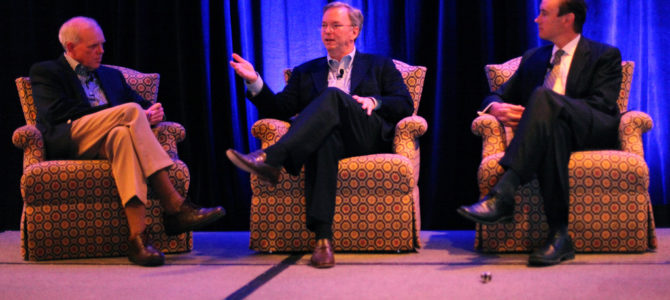
Read part one of this series here.
Americans dimly grasp that the new American regime has jettisoned the venerable public-private divide at the heart of classical liberalism. But most of us remain in the dark about what exactly is taking its place.
Despite the avalanche of regulations, rules, and guidance issued by our state and federal governments, no official—elected or otherwise—has done for Americans what President Dwight Eisenhower did in his farewell remarks on the military-industrial complex. Eisenhower was the last president to speak to us (much less warn us!) about the changing character of the American regime.
Today, it is perhaps too much to ask a president to do the same. Eisenhower was intimately familiar with America’s military and civilian bureaucracy. He recognized how a “scientific technological elite” could use both branches of federal organization to make “public policy” its “captive.” Which presumptive occupant of the White House has such a sweeping, personal grasp of the new officialdom—yet opposes it enough to bear witness?
From Making Things to Making Emotions
Today, the public policy elite has captured the very idea of public policy. Far exceeding the bounds of the old regime—the industrial, managerial, and male-yet-sterile form of rule portrayed by The Man In The Gray Flannel Suit—today’s elite has superseded the 21st-century logics of industry, management, and, perhaps most importantly, of the neutral or neutered male intellect first attributed to proper social science by Max Weber.
The logic of industry required men to fill factories and work in linear fashion to construct machines. The new logic of officialdom requires men and women—or boys and girls, depending on where we date the onset of maturity—to work in hive fashion to deconstruct, and sometimes rearrange, knowledge.
The logic of management required men with seniority to train, supervise, mentor, reward, and promote younger men, adopting a system patterned on the military. The new logic of officialdom requires men and women—or, again, boys and girls—to organize “human resources” around setting and meeting corporate goals, which are as likely to prioritize the symbolic performance of identity as they are the pursuit of profit.
As Matthew Crawford explained in Shop Class as Soulcraft, the touchy-feely panopticon of the “knowledge work” industry is equally in the business of emotion work:
in the last thirty years American businesses have shifted their focus from the production of goods (now done elsewhere) to the production of brands, that is, states of mind of the consumer, and the shift finds its correlate in the production of mentalities in workers. Process becomes more important that product, and is to be optimized by management techniques that work on a deeper level than the curses of a foreman. Further, though the demands made on workers are invariably justified in terms of their contributions to the bottom line, in fact such calculations are difficult to make; the chain of means-ends reasoning becomes opaque, and this opens the way for work to become a rather moralistic place. […] In the contemporary office, the whole person is at issue, rather than a narrow set of competencies.
From Sexless Male Rationality to Sexless Female Therapy
The logic of neutral male rationality, gendered but sexless, has given way to the logic of therapeutic administration—prefigured by Nurse Ratched in One Flew Over The Cuckoo’s Nest. Big Nurse, as she’s otherwise known, is a transitional figure between the old American regime and the new. A former Army nurse, Ratched is machine-like, robotic, bent on total control and orthogonal order. In that sense, she still inhabits the world of unsexed, male-gendered rationalism. But that should not mask the sea change that Ken Kesey detected. Goethe, as Philip Rieff reminds us, considered it “a fact that humanity will ultimately triumph”; he only feared, however, “that at the same time the world will become one great hospital in which one man will be the other’s humane nurse.” Social order, Goethe predicted, would become more female in gender; but in its rationalization and universalization, it would become female in an unsexed way. In place of the old regime’s male-gendered rule, defined by its figurative sterility, the new officialdom gives us female-gendered rule—defined by its figurative barrenness.
That is in stark contrast to the political maternalism that arose in America to reform the abuses and excesses of the sterile, male industrial age. As Ross Douthat and Reihan Salam put it in a pivotal passage within Grand New Party, “a small clique of highly educated women, which included pioneers in the social sciences and social work,” refused to surrender their moral identity to industrial rationality. These so-called maternalists “saw the slow, steady disintegration of the American family under radically new economic conditions as the central challenge of their time. They condemned Big Business’s efforts to efface and undermine the value of domestic work as the entering wedge of a broader campaign to reduce self-reliant citizens to mere consumers and clients.”
Today, in the new officialdom, this position is completely reversed. The most forceful strain of female-gendered political thought embraces postindustrial corporatism and condemns the economics of domesticity. To be sure, the ardent appreciation for birth control in the sick-dangerous realm, outside the precincts of health-and-safety regulation, betokens a mischievous sort of fearful admiration for the ultimate in deranged risk: conceiving a child not only out of wedlock but outside of love and even out of “like.”
Within the realm of health and safety, however, the mania for birth control is of a strikingly different quality. Rather than demanding consumption, it demands production; rather than a license to access the realm of transgression in which nothing is ever completely supervised or completely predictable, it is an ideological mandate to enforce healthy and safe conduct among the ruled, right down to the most intimate details and choices of their lives.
Now for Something Completely Different
The point is not that the mainstream Democratic stance on birth control is a sin of partisanship, but that in the new regime, two separate logics and cultures rule two separate, but co-dependent, realms of life. This state of affairs transcends “partisan ideologies” as we know them. The shared neoconservative and neoliberal affinity for enforced health and safety, and their shared fear and loathing of the realm of illness and unquantified risk, plainly shows that one need not identify as a Democrat, liberal, or Progressive in order to champion the new officialdom. The issue is not, as it was with the military-industrial complex, what the elites think policy should be; it is what the elites instinctively think politics is.
Sticking with this line of inquiry allows us to get beyond the many interesting but contending and partial definitions of the relevant elite in America—the “new class,” the “ruling class,” the “country club,” the “crony capitalists,” the “1 percent,” the “east-coast power corridor,” and so on. These are all manifestations or avatars of the only elite that, analytically speaking, suffices as a unit of analysis, because only this analysis indicates what everyone is struggling to surmise, namely, the character of the new American regime.
The new regime is not totalitarian, fascist, socialist, capitalist, conservative, or liberal, according to the accepted and common definitions of those terms. It is not even adequately described as corporatist, although corporatism is very much at home within it. The “pink police state” is not a police state in the sense that George Orwell would be familiar with, but one in which a militarized, national policing apparatus is woven into the fabric of trillions of transactions online and off. Nor is it a “pinko commie” regime in the sense of enforcing “political correctness” out of total allegiance to Party; rather, it enforces the restrictions and permissions doled out by its sense of “clean living.” To invoke Michel Foucault again, ours is an age when governance is inseparable from hygiene in the minds of the elite that rules over both the private and public sector. To them, everything is theoretically a health issue.
This is why the attempt at a national health care program was an utterly predictable development—a veritable precondition of our new regime’s full development. Although we like to think national health is the consequence of our extreme distaste for the suffering of some and not others, it is more the product of the categories of thought that define our regime. Health and safety is what the state does.
The industrial, mechanical logic of the old regime approached the concept of governance instrumentally. It led us to define governance by answering the question, What is the state for? The therapeutic, existential logic of the pink police state rejects such a purpose-based approach. Health and safety is not what the state is for; the practice of health and safety is literally the practice of justice.
Why We Can’t Stop Obsessing Over Sex
The prerogative thus belongs to the state, on the contemporary view, to define what is and is not healthy, and what is and is not safe. So we should not be surprised that the state has been sucked so extensively into matters of sexuality. The most socially significant conflict over sexual identity is not a lurid Manichean struggle between “traditional” and “progressive” morality. Rather, it’s an incessant struggle of attrition between realms: the realm the regime controls, with its comprehensively administered ethic of health and safety, abuts—but can never conquer—the unregulated realm of dirty danger. Adjudicating the healthfulness and safety of our myriad sexual practices, affinities, choices, and identities is a task so monumental it can keep the largest bureaucratic government busy.
To that, however, the new regime must add the chore of therapeutically processing that psycho-sexual activity. To prevent itself from being overwhelmed by a proliferation of dirty, dangerous sexual phenomena, the regime must always domesticate and incorporate new choices, new practices, and new identities, sublimating once-transgressive lifestyles into cosmetic virtues understood to aid the health and safety of the regime—whether in the “public” or “private” sector.
Here, there is no better example than the sea change in the status of LGBTQ individuals and the whole concept of diverse sexual identities. Big government and big business elites have more or less rushed with open arms to wave the rainbow flag—increasingly, in a literal sense. Today it does not really count as news that a Bank of America branch in the heart of West Hollywood has decorated its lobby with lots of festive little rainbow flags. There was, however, a minor stir when the U.S. Embassy in Tel Aviv recently hoisted the rainbow flag just below the Stars and Stripes itself.
For some, the event was a sensational reminder of the difference between the progressive, post-Judeo-Christian world and the world of reactionary Islam. Be that as it may, the official admission of queer culture into the realm of health and safety illustrates the challenges the new regime poses to our old Constitutional order. Although the First Amendment is “biased” in favor of religion—extending special protections to religious speech and practices that irreligious conduct simply does not receive—the First Amendment is also quaintly blind to the state’s current interest in establishing a secular, not religious, creed.
This is key to understanding the absolute importance of “diversity and inclusion.” These foundational ideas are not best seen as “ideological values.” They are sociological practices essential to the functioning of the new regime. And lest we imagine that the new regime is itself an ideological value in action—merely the product of a revolutionary cultural and political vanguard—it is essential for us to realize that the new regime is inherently unable to become totalitarian in the sense, say, that Leo Strauss envisioned in his legendary argument with Alexandre Kojeve.
At the midpoint of the last century, these two preeminent political theorists entered into an extended debate about the possibility of tyranny in our time. To make a long story short, Strauss worried that it would become impossible to practice philosophy in what Kojeve claimed was a just regime. That regime, said Strauss, would successfully persecute philosophers out of existence, just as ancient Athens sentenced Socrates to death. The Athenians, of course, charged Socrates with corrupting the city’s youth. Though Strauss does not come right out and say it, his defense of philosophy raises the arresting prospect of a deep connection between free thinking, wisdom, and—from the standpoint of an unjust regime—sickness and danger. Strauss, however, seemed really to believe that modern political science had made universal tyranny—the eradication of philosophy—conceivable for the first time.
The rise of the pink police state should disabuse us of that notion. The new social divide that defines our new regime will always propagate zones of transgression against health and safety as defined by officialdom. This is not just because the horizon of transgression always recedes from the reach of officialdom, however unprecedented in its scope—although it is certainly true that the Internet, and the patterns of thought and action it allows us to carry into “real life,” have created a topography of transgressive space so protean that the National Security Agency, for instance, must vacuum up all the data in the world just to hope that it can find some transgressions. That may be good news for terrorists. It is great news for philosophers.
The rise of the Internet, in fact, is emblematic of the strange conceptual character of the new regime. Although the state is implicated in the rise of the Internet, and although the state is dogged in perpetually intervening in the Internet, the Internet has a life of its own. It can never be fully integrated into the regime. The Internet is a symbol of how partial is the responsibility of the pink police state for its own dawning triumph. Our new regime is so deeply therapeutic because it is, viewed in psychoanalytic terms, a coping mechanism for the disintegration of the public-private divide. Although Rieff declared that “the rot starts at the top, always,” he acknowledged that in America there never was an “officer class” to abdicate its commanding culture caste. The innovation of our age is a new officialdom that does not owe its power to its position atop the hierarchy of cultural authority. That vertical of social order is gone; in its place, our movement within social space and time is horizontal.
That is typical of democratic ages, when things are always getting better and worse. We are always becoming more like Eloi and more like Morlocks. The “rot”—in Rieff’s terms, the choice to violate boundaries set down by cultural authorities, starts everywhere, in every soul or psyche. The collapse of the public-private divide is not the “fault” of America’s decadent elites, its debased underclass, or its neurotic middle class. It is the fault of everything and everyone in contemporary life. As Augustine said: Such as we are, such are the times.
Three Things to Expect From This Regime
Although government health care opponents fear our regulatory state will decree ever broader swaths of life “public,” the reality is that the whole language of “public” and “private” is passing away as the “pink police state” comes into being.
To return to the question we began with, what, then, replaces that primary social divide? The new divide, we recognize, has to do with a sick-dangerous realm on the one hand and a healthy-safe one on the other. We can now start to see that the safe-and-healthy realm is the official realm, which makes the sick-and-dangerous realm the unofficial realm.
In the new regime, the regulatory state asserts control over those areas of “public” and “private” life that it chooses to control, while leaving other areas relatively (sometimes completely) out of control. Life in the official realm is characterized by the pursuit of health and security—the clean, safe, but coercively sterile world—while life in the unofficial realm is characterized by the pursuit of harms and risks—the dirty, dangerous, but ultimately and inexorably fertile world.
Establishing this framework allows us to trace a chain of three causal mechanisms that show us what to expect from the new regime in action.
First, in a culture where social or interpersonal freedom is valued much more than political freedom, government becomes assertive in restricting “unhealthy” and “risky” activity, but assertive in broadening the ability of individuals to pursue pleasure in “healthy” and “secure” ways. That means both more permissiveness and more intervention in sexual life: a bigger portion of society is “sexualized,” and a bigger portion of society falls within the official sphere of life. (For a long time, that has certainly not been the case. Now it is. Such are the hallmarks of a revolution, the ending of one regime and the beginning of another.)
Second, government’s active interest in partnering intimately with individuals to help them achieve safe, secure pleasure and satisfaction leads strangely to a culture of greater transgression outside the reach of the government, in the unofficial sphere it doesn’t control. This is ironic. Katherine Frank wants to show that the Iranian regime’s oppressive moralism pushes Iranian youth to explore orgies as forms of rebellion not just in mores but in politics too. But in a pattern repeated literally around the clock on college campuses, the American regime’s sex-positive official moralism seems to inspire individuals to also seek unregulated, unofficial, and officially disapproved-of hedonic experiences—in addition to, or even instead of, what’s officially endorsed.
What’s more, sex-positive government moralism can and sometimes does look down on those who would have “too much” reproductive sex—whether “irresponsibly” or not. The realm of officialdom is a realm, as William Voegeli has written in Never Enough, of a limitless appetite for resources. But officialdom is perpetually anxiety-ridden about the possibility of exhausting its resources—whether it is figuratively sterile or figuratively barren. That is because its controlling opposition to the unclean, unhealthy, and unsafe always arouses a fear of contamination. (Psychologically, the insinuation of that fear into the otherwise-expert confidence of officialdom quietly demonstrates how vulnerable the official realm really is to being contaminated!)
Indeed, in the official realm, the possibilities of productive effort are sharply narrowed by rejecting the fecundity of the unclean, unsafe realm. In the unofficial sphere, by dramatic contrast, those concerns and fears are absent. Instead, the habit is to squander its characteristic creative and generative resources.[1]
Returning to our three causal mechanisms: Lastly, and most troublingly, the political and cultural relationship defining the pink police state seems to not be a stable system. There is no logical limit to how intrusive the new regime will get. Because political freedom is disvalued, once-“public-” and once-“private-”sector surveillance and monitoring may become completely comprehensive and permanent. This result is encouraged by a culture which feels increasingly fated to do what it is apt to do anyway by choice: put interpersonal, hedonic freedom far above political freedom in our relations with the state. Because interpersonal, hedonic freedom is so privileged, resistance may completely break down to government actions that get involved in the intimate details of our lives in ways that agents of the state believe properly promote and advance that freedom.
At the same time, because official forms of pleasurable freedom never seem to be enough (that is, never capable of actually satisfying the human appetites toward which they are aimed) there is no logical limit to the degree of boundary-crossing, risk-indulging, and pleasure-seeking transgression within the unofficial sphere of life—which, in the “pink police state,” is a built-in, ineradicable, and necessary sphere.
Paradoxically, and problematically, the official and unofficial realms that construct our new regime are co-dependent yet limitless in their appetites. That relationship raises the arresting prospect that our souls or psyches do indeed mirror the structure and pattern of the pink police state. To fully articulate an anthropological view of the new regime, however, we stand to benefit from an exploration of its recent origins.
Follow James Poulos on Twitter.
[1] For a glimpse at the psychological and philosophical pitfalls, facing Nietzsche, Emerson, and others, that surround squandering, selfhood, religion, commerce, and fear, see Mark Manolopoulos, If Creation Is A Gift, p. 47.









